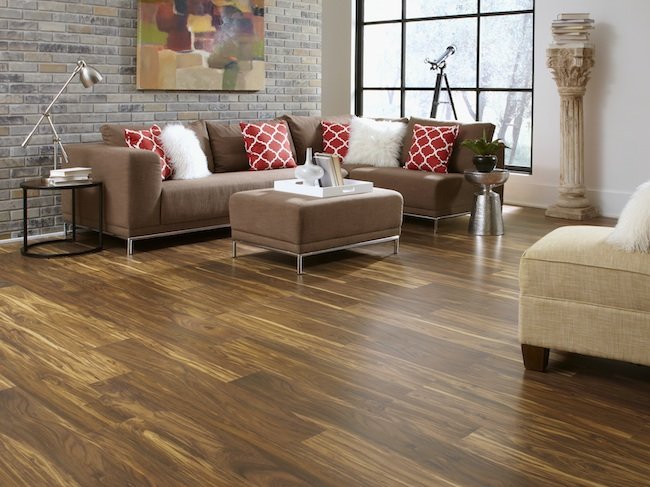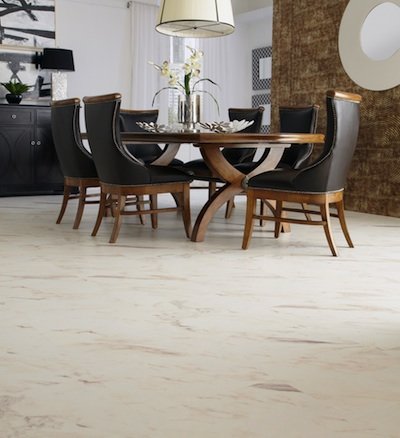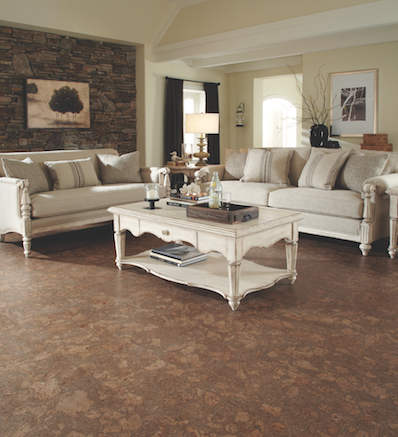

We may earn revenue from the products available on this page and participate in affiliate programs. Learn More ›
While cork flooring has been around for many years, the plant-based floor covering is quickly becoming a favorite for homeowners due to its durability, ease of cleaning, low cost, and sustainability. Most DIY-savvy homeowners can install cork floors themselves by choosing cork tiles that glue down (tiles with adhesive backing are even easier to work with), or click-together cork planks for a floating floor.
No matter your budget or style, you can find a solid cork floor that will make your home look amazing and offer several additional benefits compared to laminate or hardwood flooring, such as:
- Easy Installation: Cork flooring comes in a variety of standard forms like floor tiles and planks.
- Easy to Maintain: Once sealed with polyurethane, cork floors can look beautiful for years to come. Use a regular vacuum to pick up dust, and a damp mop to lift heavy stains.
- Hypoallergenic: Cork floor coverings are naturally resistant to mildew, the material is hypoallergenic, and there are even antimicrobial cork planks available.
- Comfortable: Cork is a great flooring material because it is comfortable to walk on and stand on for long periods of time.
- Environmentally Friendly: Cork flooring is an eco-friendly wood flooring because it comes from the bark of the cork oak tree, which can be sustainably harvested time and time again.
RELATED: 20 Sustainable Home Decor Brands to Shop Now
Why should you choose cork flooring?
In our ongoing quest to make our homes beautiful reflections of who we are, the question of what to install underfoot is an important one. For some people, gleaming oak is the answer; for others, salvaged pine planks or Mediterranean-style tiles. In recent years, cork flooring has become yet another popular option.
“There are natural benefits of cork flooring, including easy maintenance, sound absorption, warmth, and comfort,” says Ebony Costain, a buyer at Lumber Liquidators. “What consumers may find most surprising, however, are the attractive varieties that have been brought to market.” Cutting-edge technology has allowed manufacturers to offer flooring with the amazing look of hardwood or marble, while keeping all the benefits of cork. To determine if cork is a good choice for your floor, consider how well the following statements apply to you.
New cork floors keep your feet warm.
If you usually wear socks or slippers around the house to avoid cold floors under your feet, you’ll appreciate cork’s ability to stay at room temperature and therefore feel warm to the touch.
Like a cushion underfoot, cork floating floors also ease stress on your back and legs, making it a good fit for any place in your home where you’ll be standing for long stretches of time, like kitchens, laundry rooms, and workshops.

Cork tiles look great with most interior styles.
Cork flooring comes in a wide array of colors and grain patterns, so the design possibilities are limitless. Just about any floor motif that can be made with paint or ceramic tile—think checkerboards, stripes, or chevrons—can be made with cork.
Let your imagination soar! Some owners even play with the pattern of the cork itself to create a design that mimics exotic wood grains like tiger maple, or the stone striations of marble or granite.
Whatever style you choose, you’ll enjoy the surprised expressions when guests first step into a room.
RELATED: The 7 Best Low-Cost Alternatives to Hardwood Flooring
Cork flooring reduces noise.
Cork’s acoustic properties make it an ideal choice for any home in which echoing presents a problem—in pared-down interiors with hard laminate flooring, few rugs and curtains, for example, or in apartment buildings where downstairs neighbors tend to call at the slightest footfall.
The pitter-patter of tiny feet becomes a bit less thundering with a layer of cork, while the material’s pliancy along with whatever cork underlayment you choose would be an added benefit should any tot happen to stumble. Bedrooms, bathrooms, and laundry rooms are a great place to install a cork floor whether as a DIY project or with a professional installer.
Cork flooring is eco-friendly.
Some homeowners worry about using hardwood flooring in their homes because they don’t want to promote deforestation or harm the environment. Unlike harvesting wood from most types of trees, cork trees—native to Spain and Portugal—have a type of bark that regenerates after harvesting and can be trimmed again in nine years’ time.
Cork floor tiles are made from the remnants of cork wine-stopper manufacturing and are a truly sustainable option for homeowners in search of eco-friendly materials. This means that you can enjoy all the benefits of natural cork flooring without worrying about environmental impacts that come from your home’s flooring materials.

Cork flooring is durable.
Forget high-traffic areas—your whole house is in constant motion with kids, pets, and projects in flux.
Cork is an ideal flooring product because it offers unmatched durability compared to other flooring materials. Small dents in cork flooring fill themselves in again and shallow scratches visually blend into the overall pattern, unlike marring on wood floors, which is typically easy to see and a hassle to refinish.
RELATED: How to Install Engineered Hardwood Floors
Cork floors are low maintenance.
As it does with small scratches, the highly textural pattern of cork helps mask light stains and marks. Sweeping and occasional mopping with a damp cloth is all that’s needed to keep cork floors looking their best.
That said, putting felt pads on furniture feet—just as you would with hardwood flooring—can help extend the life of cork tiles. Cork products are also easy to clean and you will be able to clean up most of the messes around your home with a vacuum or damp mop.
Cork flooring is cost-effective.
At about $3 to $8 per square foot, cork is comparable in price to other flooring options such as hardwood, carpeting, or tile.
Whether you choose cork tiles that are positioned with an adhesive or those that feature a tongue-and-groove system, installation is easy for most do-it-yourselfers, which helps to keep costs low. And once the floor is in place, cork’s thermal properties maintain room temperature even in cold weather, which can alleviate your heating costs in winter.
So, is cork flooring the right choice for you?
Cork is a great flooring option for your home if you want a warm, attractive, cost-effective, and eco-friendly material for your home’s floor. You can choose a natural cork style if you want a more rustic look, or you can choose from a number of other styles to go with your home’s interior design!
This post has been brought to you by Lumber Liquidators. Its facts and opinions are those of BobVila.com.